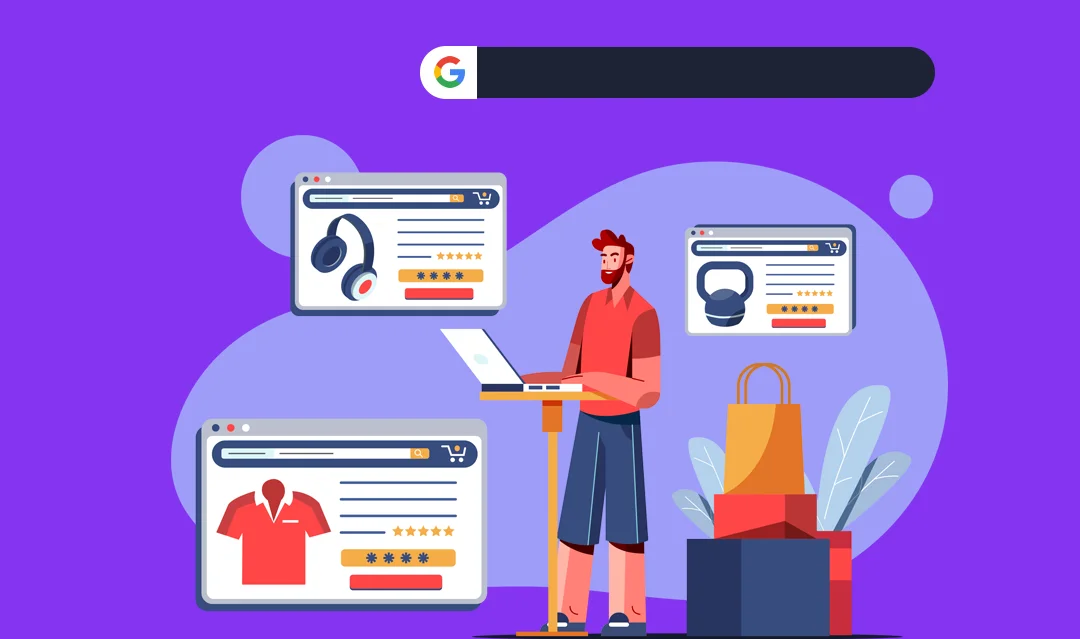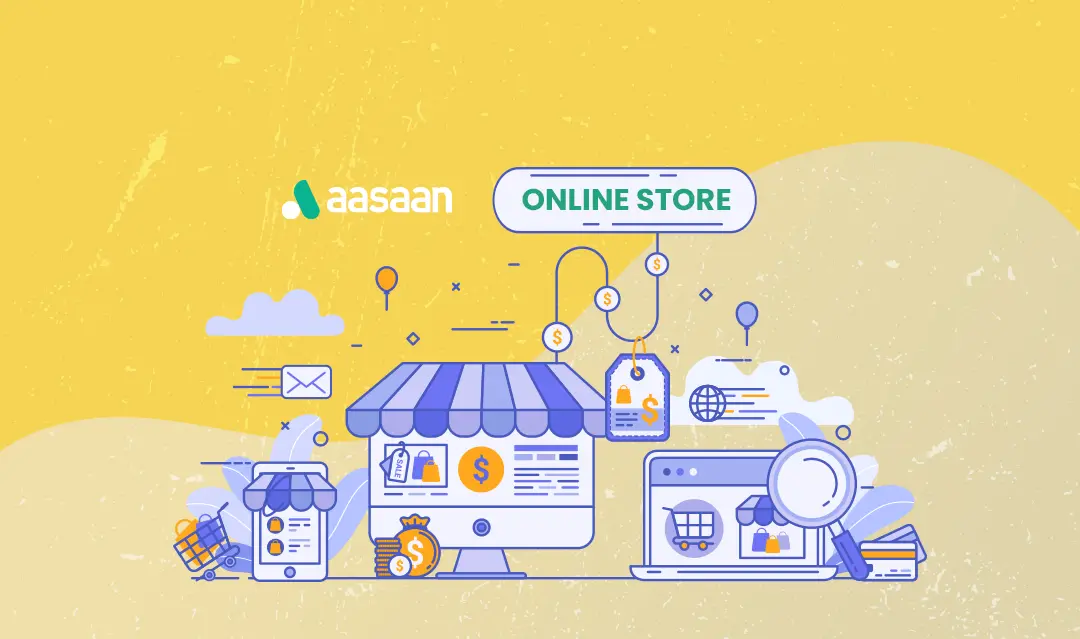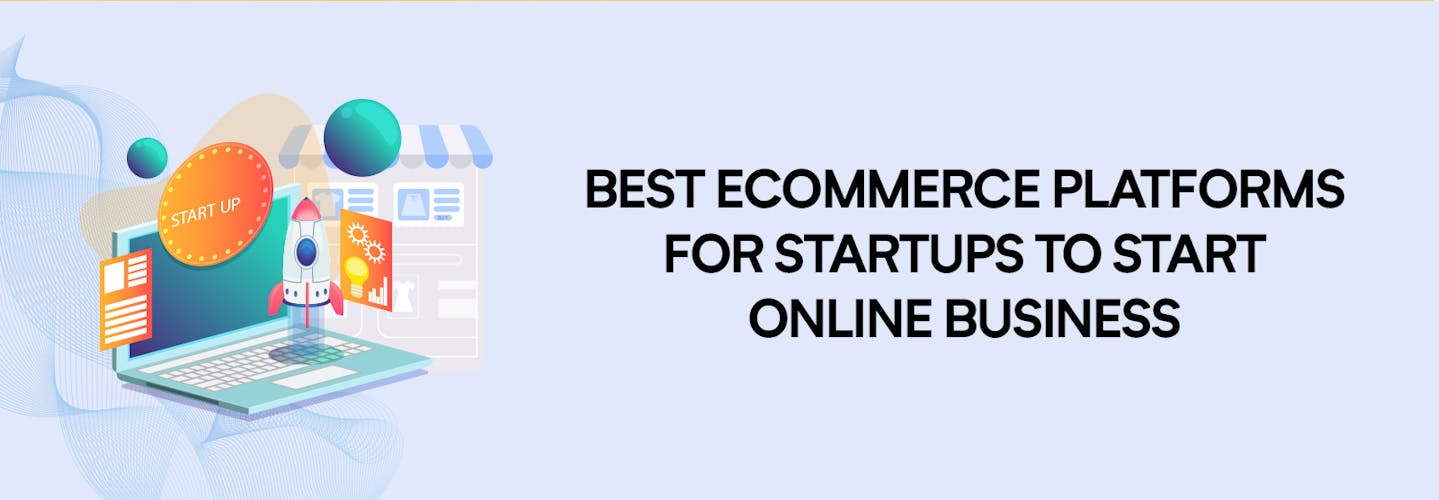
10 Best Game-Changing Ecommerce Platforms for Startup Success in 2024
In the rapidly evolving digital landscape of 2024, the selection of the right ecommerce platform can make or break a startup.
With the surge in online shopping and digital transactions, startups are increasingly leveraging ecommerce platforms to reach a wider audience, streamline operations, and maximize profits.
This article will delve into the Top10 Startup friendly eCommerce platforms, providing a comprehensive guide for entrepreneurs looking to kickstart their online businesses.
The startup scene has been buzzing with activity, with recent statistics shows that Roughly 100 million startups open each year, showing a significant uptick in the number of new ventures. As of May 2023, there are over 1,200 unicorns around the world
Now, let’s proceed to explore the best ecommerce platforms for startups in 2024, which can provide the necessary tools and features to help these new businesses thrive in the digital marketplace.
What is an eCommerce startup?

An eCommerce startup is a newly established business that primarily operates online, engaging in buying and selling of goods or services through a website or mobile app.
These companies leverage the internet and modern technologies to facilitate digital transactions between consumers and retail or business vendors.
Why Ecommerce Platforms are Essential for Startups?
Ecommerce platforms enable businesses to sell their products and services online, making it essential for startups to navigate the competitive digital environment.
Selecting the best platform is crucial for success, as it impacts user experience, marketing efforts, security, and more.
Factors Influencing Platform Selection
Before jumping into which platforms top the list, we should consider the factors that affect selecting an Ecommerce platform:
- Cost and scaling
- User-friendly interface
- Marketing tools integration
- Platform customization
- Security and other support options
- Analytics and reporting capabilities
- Mobile optimization
- Payment processing options
- Comprehensive customer support
- Scalable product management
And with these factors in mind, we present our picks for the best E-commerce platforms for startups:
Top 10 Ecommerce Platforms for Startups
Considering the needs of your venture and the services you provide, be sure to consider these standout Ecommerce platforms:
1. Aasaan: The All-in-One Solution for Startups
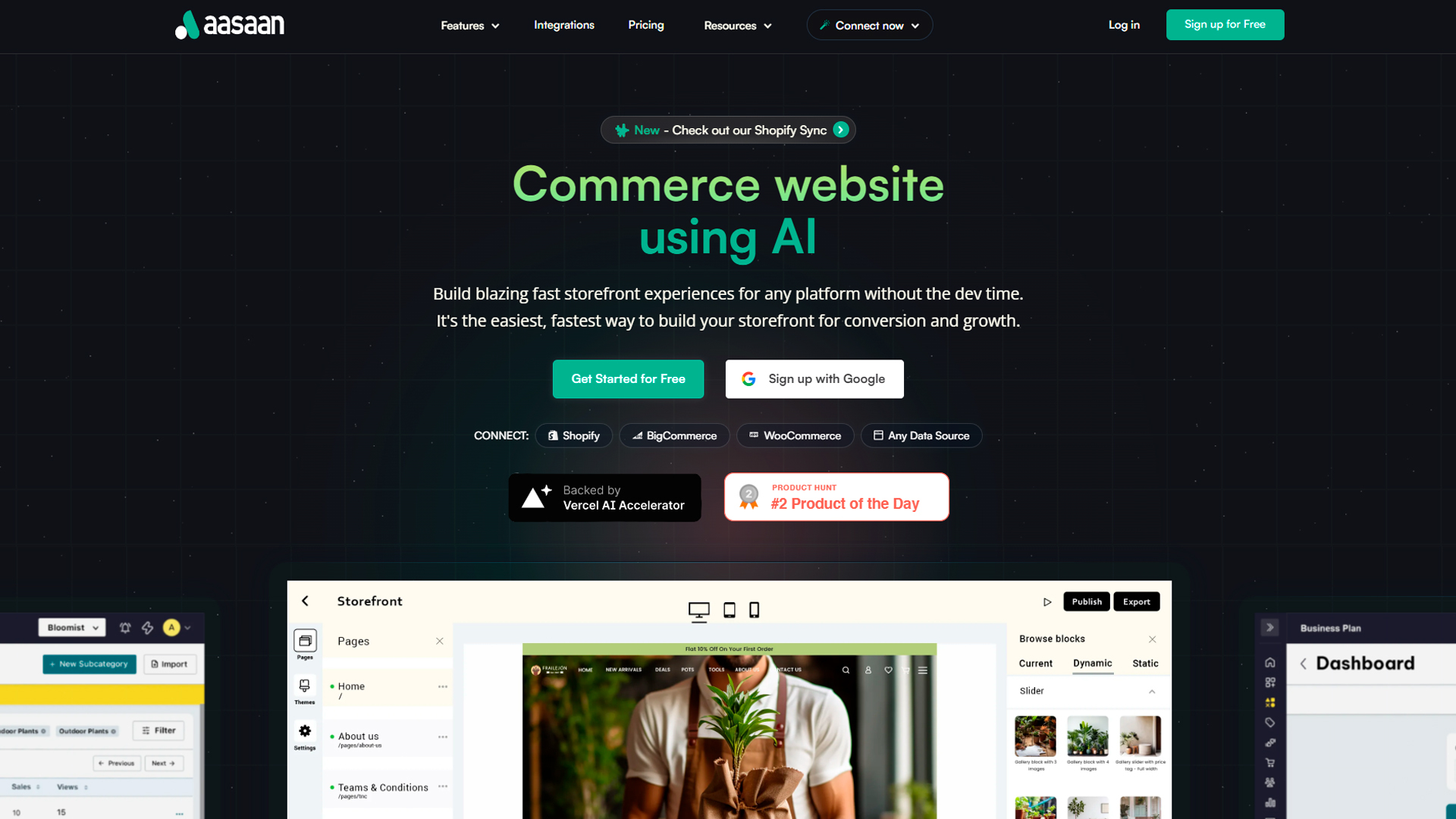
When it comes to finding an easy-to-use ecommerce platform, Aasaan App has got you covered.
This platform is designed to simplify the process of creating and managing your online store, making it a perfect fit for startups and small businesses like yours.
Key Features:
- Intuitive Store Setup: With Aasaan App, you’ll enjoy a hassle-free store setup experience. The platform guides you through each step, ensuring that you can get your online store up and running in no time.
- Mobile Commerce: Aasaan App takes a mobile-first approach, ensuring that your online store is fully optimized for mobile devices. This way, you can reach and engage with the growing number of customers who prefer to shop on their smartphones or tablets.
- Inventory Management: Managing your products, variants, and stock levels is a breeze with Aasaan App. The platform provides efficient inventory management tools, helping you stay organized and on top of your inventory.
- Secure Payment Options: Aasaan App integrates with trusted payment gateways, ensuring secure transactions for both you and your customers. This way, you can provide a seamless and trustworthy checkout experience.
- Marketing and Promotion: Aasaan App understands the importance of marketing and promotion for your business. That’s why they offer built-in tools to help you attract and engage customers, including discounts, coupons, and social media integration.
- Multiple Sales Channels: Aasaan allows you to sell your products across various channels, including your website, Facebook, Instagram, and marketplaces like Amazon and eBay. This wide reach helps you expand your customer base and boost sales.
- Customer Support: Should you ever need assistance, Aasaan App has your back. The platform provides reliable customer support through various channels such as email and live chat, ensuring that you receive the help you need in a timely manner.
Pricing Plans:
- Standard plan: $24 per month when billed monthly or $18 when billed annually.
- Premium plan: $75 per month when billed monthly or $50 when billed annually.
- Business plan: priced at $199 per month when billed monthly or $165 per month when billed annually.
- Enterprise: If you have specific requirements or are running a larger business, Aasaan App offers customized enterprise plans that can be tailored to meet your unique needs.
Pros and Cons:
Pros:
- Easy and intuitive store setup process, allowing you to get started quickly.
- Mobile-first approach ensures that your online store is optimized for mobile shoppers.
- Efficient inventory management tools keep your products organized and stock levels in check.
- Secure payment options provide peace of mind for both you and your customers.
- Built-in marketing tools help you attract and engage customers effectively.
Cons:
- Free plan include aasaan branding
2. Shopify: A Comprehensive Ecommerce Solution for Growing Startups

Shopify is a popular choice among startups for its ease of use and powerful features. With a vast range of apps and integrations, Shopify is an excellent option for businesses looking for an all-in-one solution.
Key Features:
- Seamless Store Setup: Shopify’s intuitive interface allows you to set up your online store with ease. Thanks to its drag-and-drop builder, creating a beautiful and responsive store has never been more straightforward.
- Customization: With countless themes and apps available, Shopify lets you fully tailor your store to suit your branding and functionality needs.
- Advanced Marketing Tools: From email marketing to social media integration, Shopify offers a wide range of tools to attract and retain customers.
- Analytics and Reporting : Shopify gives you access to valuable data on website visitors, sales, and inventory, helping you make data-driven decisions for your business.
- Payment Gateway Integrations: Shopify accepts a variety of payment options, making it easier for customers to shop and purchase items from your store.
- Scalable and Flexible: Shopify can accommodate your business’s growth, offering different plans and capabilities to suit your specific needs.
Pricing Plans:
- Basic: The Basic plan starts at $29 per month, giving startups access to essential features, such as unlimited products, shipping, and payment options.
- Shopify: Their most popular option, available for $79 per month , offers advanced features such as gift cards, professional reports, and lower transaction rates.
- Advanced: Priced at $299 per month, this plan provides extensive features like advanced report builder, third-party calculated shipping rates, and lower credit card fees.
Pros and Cons:
Pros:
- Intuitive platform and seamless store setup process.
- A wide range of customization options through themes and apps.
- Comprehensive marketing tools to drive traffic and customer engagement.
- In-depth analytics and reporting to help guide business decisions.
- Supports various secure payment methods and gateway integrations.
- Scalable and flexible platform for businesses of different sizes.
Cons:
- Transaction fees can add up, especially on the lower-priced plans.
- Some essential apps and features may require additional cost.
- Customer support experience may vary depending on the issue at hand.
3. WooCommerce: A Flexible WordPress-Based Ecommerce Platform
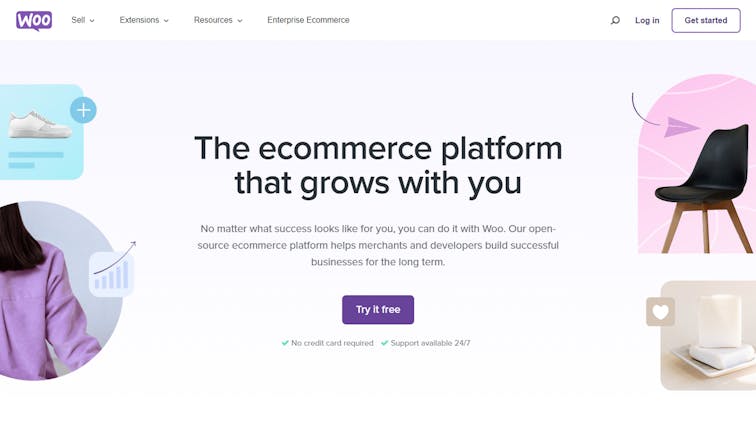
When it comes to setting up and managing your online store, WooCommerce is a reliable and versatile platform that caters to your specific needs. With its robust features and flexibility, WooCommerce empowers you to create a successful ecommerce business.
Key Features:
- Extensive Customization: WooCommerce provides a wide range of customizable themes and plugins, allowing you to personalize your online store according to your brand’s identity and requirements.
- Product Management: The platform offers efficient tools for managing your products, including adding new items, updating inventory, and organizing product variations.
- Secure Payments: WooCommerce integrates with various payment gateways, ensuring secure transactions for you and your customers. It also supports popular payment options such as PayPal and Stripe.
- Flexible Shipping Options: With WooCommerce, you have the flexibility to set up multiple shipping methods, define shipping zones, and offer real-time shipping rates to provide accurate shipping costs to your customers.
- SEO-Friendly: The platform is designed with search engine optimization (SEO) in mind, providing features such as customizable URLs, meta tags, and integration with popular SEO plugins.
- Analytics and Reporting: WooCommerce offers built-in analytics and reporting tools, enabling you to track sales, monitor customer behavior, and gain valuable insights to make data-driven decisions.
Pricing Plans:
- WooCommerce: The WooCommerce plugin itself is free to use, allowing you to set up your online store without any additional cost.
- Extensions and Add-ons: WooCommerce offers a wide range of extensions and add-ons, both free and paid, that provide additional functionality and features to enhance your online store. The pricing for these extensions varies.
Pros and Cons:
Pros:
- Highly customizable platform to match your unique brand and business needs.
- Seamless integration with popular payment gateways, providing secure transactions.
- Flexible shipping options to cater to different customer locations and preferences.
- SEO-friendly features to improve your store’s visibility in search engine rankings.
- Access to a wide range of extensions and add-ons to enhance functionality.
Cons:
- Requires technical knowledge for setup and customization, especially for more complex features.
- Additional costs may be incurred for certain extensions and premium themes.
- Relies on third-party plugins for certain advanced features, which may have varying levels of support.
4. Branchbob: A Cost-Effective and User-Friendly Ecommerce Solution

Branchbob is an affordable and user-friendly ecommerce platform that allows businesses to build and manage their online store effortlessly.
With its rich feature set and ease of use, Branchbob enables entrepreneurs to start selling online with minimal investment and time.
Key Features:
- Easy Store Setup: With Branchbob, setting up your online store is a breeze. The platform provides a user-friendly interface and step-by-step guidance, allowing you to create your store quickly and effortlessly.
- Product Management: Branchbob offers robust product management tools, enabling you to easily add, edit, and organize your products. You can also manage inventory, variations, and track stock levels effortlessly.
- Secure Payment Options: The platform integrates with trusted payment gateways, ensuring secure transactions for you and your customers. It supports popular payment methods, providing a seamless checkout experience.
- Customizable Design: Branchbob allows you to customize the design of your online store to reflect your brand’s identity. You can choose from various templates and personalize the layout, colors, and fonts to create a unique look.
- Marketing and SEO Tools: Branchbob provides built-in marketing and SEO features to help you promote your products and improve your store’s visibility. You can optimize your store for search engines and run promotional campaigns effortlessly.
- Responsive and Mobile-Friendly: Branchbob ensures that your online store looks great on all devices, including desktops, tablets, and smartphones. It offers responsive design templates that adapt to different screen sizes.
Pricing Plans:
- Free: Branchbob offers a free plan with basic features, allowing you to get started with your online store at no cost.
- Premium: For more advanced features and additional support, Branchbob offers affordable premium plans starting at a low monthly fee.
Pros and Cons:
Pros:
- User-friendly platform with an intuitive interface.
- Robust product management tools for easy inventory management.
- Integration with trusted payment gateways for secure transactions.
- Customizable design options to create a unique store.
- Built-in marketing and SEO tools for promoting your products.
Cons:
- Advanced features may be limited compared to some competitors.
- The selection of templates and design options may be relatively smaller.
- Customization options may have some limitations compared to more flexible platforms.
5. Squarespace: A Sleek and Stylish Ecommerce Solution
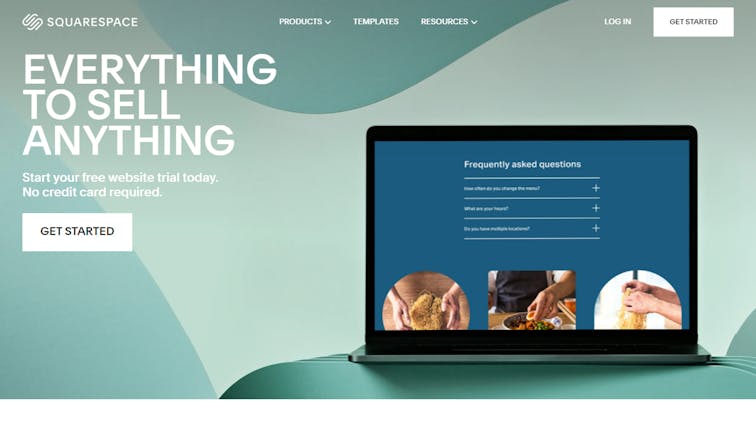
Squarespace is a platform known for its visually appealing storefront designs and sleek user interface. It enables online entrepreneurs to create eye-catching and professional stores, while offering useful ecommerce tools and features.
Key Features:
- Stunning Storefront Designs: Squarespace provides you with a selection of elegant and modern design templates to create an aesthetically stunning online store that showcases your products beautifully.
- Product Management: Squarespace offers a comprehensive range of tools for managing products, inventory, and variations to ensure smooth online store operations.
- Secure Payment Options: The platform integrates with major payment gateways such as Stripe, PayPal, and Apple Pay, ensuring secure transactions and a seamless checkout experience for your customers.
- Flexible Shipping and Tax Settings: Squarespace allows you to configure shipping and tax settings according to your preferences and business needs. This includes setting custom shipping rates, calculating real-time shipping costs, and setting up tax rules.
- Marketing and SEO Tools: Squarespace offers built-in marketing and SEO tools that help drive traffic to your online store, optimizing your storefront for search engines and assisting you in running effective promotional campaigns.
Pricing Plans:
- Personal: Squarespace offers a personal plan with basic features for bloggers and simple websites, available at a monthly fee.
- Business: The business plan provides more features tailored to small businesses and online stores, including ecommerce tools and advanced analytics, available at a higher monthly fee.
- Commerce: Squarespace offers two commerce plans - Basic and Advanced - with additional ecommerce tools and features for professional online stores, available at higher monthly fees.
Pros and Cons:
Pros:
- Beautiful and responsive design templates for a professional-looking online store.
- Comprehensive product management and inventory tracking tools.
- Integration with major payment gateways for secure transactions.
- Flexible shipping and tax settings to cater to varying business needs.
- Built-in marketing and SEO tools to help grow your online presence.
Cons:
- Can be more expensive compared to some competitors, especially for smaller businesses and startups.
- Limited in terms of third-party integrations compared to other ecommerce
6. Wix
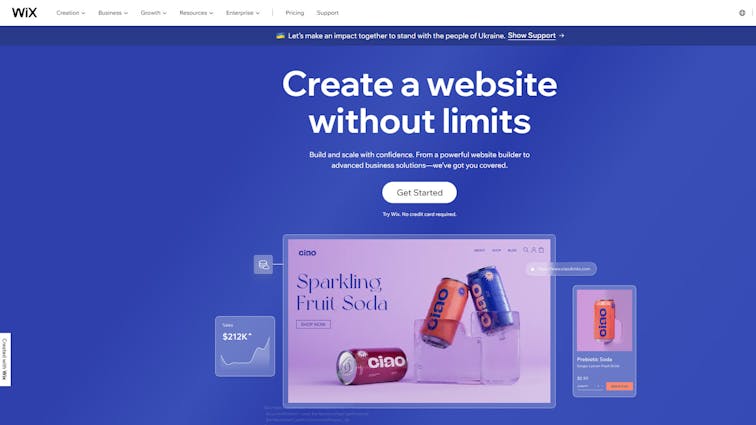
If you’re looking for a versatile and user-friendly ecommerce platform, Wix is an excellent choice.
With its intuitive interface and robust features, Wix empowers you to create and manage your online store with ease.
Key Features:
- Drag-and-Drop Website Builder: Wix offers a powerful drag-and-drop website builder, allowing you to create a visually appealing online store without any coding knowledge. You can easily customize the layout, design elements, and content to match your brand’s identity.
- Product Management: The platform provides efficient product management tools, enabling you to add, organize, and showcase your products effectively. You can easily update product details, prices, and inventory levels.
- Secure Online Payments: Wix integrates with trusted payment gateways, ensuring secure transactions for you and your customers. You can accept payments through various methods, including credit cards, PayPal, and more.
- Mobile-Optimized Stores: Wix ensures that your online store looks great on mobile devices. It automatically creates a mobile-optimized version of your store, allowing customers to browse and make purchases seamlessly on their smartphones or tablets.
- Marketing and SEO Tools: Wix offers built-in marketing and SEO features to help you promote your online store and improve its visibility. You can create promotional campaigns, optimize your store for search engines, and track your site’s performance.
- App Market: Wix has an extensive app market that allows you to enhance your store’s functionality with various third-party apps. You can integrate additional features such as live chat, customer reviews, and more.
Pricing Plans:
- Business Basic: Starting at $23 per month, this plan offers essential features for small businesses.
- Business Unlimited: Starting at $27 per month, this plan provides additional features such as professional logo creation and visitor analytics.
- Business VIP: Starting at $49 per month, this plan includes premium features like priority support and VIP subscriptions.
Pros and Cons:
Pros:
- User-friendly interface with a powerful drag-and-drop website builder.
- Efficient product management tools for easy organization and updates.
- Integration with trusted payment gateways for secure online transactions.
- Mobile-optimized stores for seamless mobile shopping experiences.
- Built-in marketing and SEO tools to promote and improve visibility.
Cons:
- Customization options may have some limitations compared to more flexible platforms.
- Advanced features may be limited compared to specialized ecommerce platforms.
- Higher-priced plans may be required to access certain premium features.
7. Ecwid
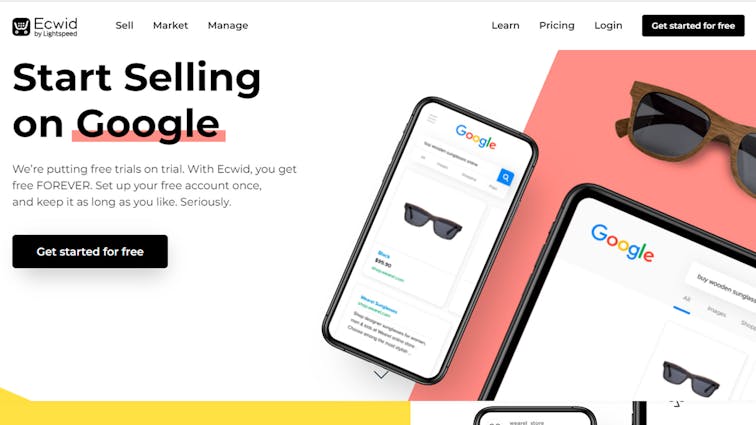
If you’re searching for a seamless and flexible ecommerce platform, Ecwid is the perfect choice for your online store.
With its easy integration and extensive features, Ecwid empowers you to create and manage your business with convenience and efficiency.
Key Features:
- Easy Integration: Ecwid seamlessly integrates with your existing website, blog, or social media accounts. It allows you to add an online store to your platform without the need for complex coding or website migration.
- Product Management: Ecwid provides intuitive tools for managing your products. You can effortlessly add new products, edit details, and track inventory levels. The platform supports unlimited products, ensuring scalability as your business grows.
- Multiple Sales Channels: Ecwid allows you to sell your products across various channels, including your website, Facebook, Instagram, and marketplaces like Amazon and eBay. This wide reach helps you expand your customer base and boost sales.
- Mobile Commerce: With Ecwid, your online store is mobile-responsive, ensuring a seamless shopping experience for customers on smartphones and tablets. It also provides a dedicated mobile app for you to manage your store on the go.
- Secure Payment Options: Ecwid integrates with trusted payment gateways, offering secure transactions for you and your customers. You can accept payments via credit cards, PayPal, Stripe, and more, providing convenience and peace of mind.
- Marketing and Promotions: Ecwid offers built-in marketing features to help you promote your products. You can create discounts, coupons, and promotional campaigns to attract customers and boost sales.
Pricing Plans:
- Venture: The Venture plan starts at $15 per month and is suitable for small businesses looking to establish an online presence.
- Business: Starting at $35 per month, the Business plan offers advanced features and tools for growing businesses.
- Unlimited: The Unlimited plan is available at $99 per month and provides unlimited storage, priority support, and additional premium features.
Pros and Cons:
Pros:
- Seamless integration with existing websites, blogs, and social media platforms.
- Intuitive product management tools for easy organization and scalability.
- Multiple sales channels for reaching a wider customer base.
- Mobile-responsive design for an optimized shopping experience on smartphones and tablets.
- Secure payment options for hassle-free transactions.
- Built-in marketing features to promote and boost sales.
Cons:
- Advanced customization options may be limited compared to some specialized platforms.
- Certain features may require higher-priced plans.
- Additional transaction fees may apply based on the payment gateway used.
8. 3dcart:
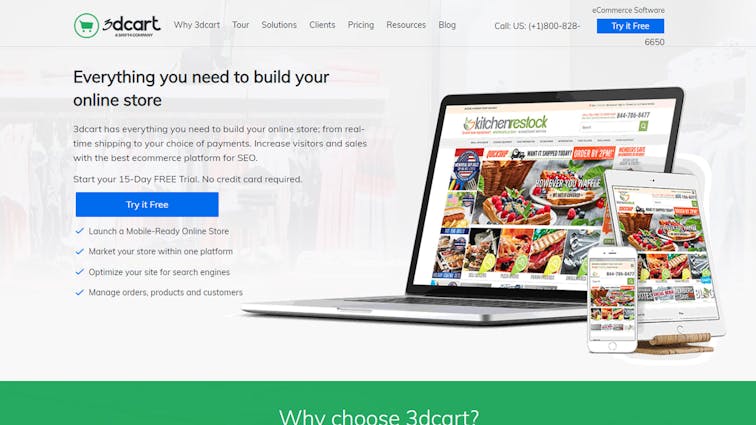
3dcart is a robust choice for businesses looking to establish a successful online store.
Featuring versatile tools for product management and marketing, the platform boasts exceptional customization capabilities suitable for businesses of varying sizes.
Key Features:
- Easy Store Building: The 3dcart platform makes it simple to build and customize your store, tailoring each element to your unique business requirements. With a variety of themes and responsive design options, your store will look great on desktop and mobile devices alike.
- Product Management: 3dcart is equipped with powerful product management tools, letting you add, edit, and track inventory effortlessly. The platform also handles product categories, options, and variants for an organized and efficient user experience.
- Payment Integration: 3dcart integrates with popular payment gateways, allowing for secure and reliable transactions. With support for credit cards, PayPal, Stripe, and other payment providers, your customers are offered a choice in their preferred method.
- Marketing & SEO: The platform includes advanced SEO features alongside built-in marketing tools to increase visibility and attract potential customers. Its in-built tools provide promotional campaigns, email marketing, and discount codes, helping boost sales.
- Multi-Channel Selling: With 3dcart, you can expand your reach by selling across various sales channels. Connect your store to channels such as Facebook, Instagram, Amazon, and eBay to enhance your visibility and customer base.
Pricing Plans:
- Startup: The Startup plan is priced at $19 per month and is ideal for those launching an online store on a smaller scale with essential features.
- Basic: Starting at $29 per month, the Basic plan offers additional features suited for growing businesses, including more integrations and user accounts.
- Plus: The Plus plan is available at $79 per month, providing an assortment of advanced features and tools perfect for medium-sized businesses.
- Pro: Priced at $229 per month, the Pro plan is designed for large businesses with high volume sales, offering more resources and an increased level of support.
Pros and Cons:
Pros:
- User-friendly interface with a wide range of customization options.
- Advanced product management tools for efficient organization and inventory tracking.
- Secure payment integration with popular gateways for seamless transactions.
- Comprehensive marketing and SEO features to boost visibility and attract customers.
- Multi-channel selling capabilities for improved reach and customer engagement.
Cons:
- Some features may be available only on higher-priced plans.
- Limited free themes compared to other platforms.
- Additional transaction fees may apply based on the payment gateway used.
9. Sellfy:

Sellfy is a user-friendly e-commerce platform designed specifically for creators, such as artists, designers, and content creators, who wish to sell digital and physical products.
Ideal for those with a creative focus, Sellfy boasts a simple platform with powerful built-in tools for marketing and sales, ensuring creators receive the best possible support for their e-commerce ambitions.
Key Features:
- Easy Store Setup: Sellfy allows you to easily build and customize your online store without requiring technical knowledge. Personalize your store design with various themes and design elements to enhance your brand’s identity.
- Product Management: With flexible product management features, Sellfy supports selling both digital and physical products. You can seamlessly add, edit, and organize your products, ensuring a smooth shopping experience for your customers.
- Instant Digital Delivery: Sellfy ensures fast and secure delivery of digital products to customers. After a completed purchase, customers instantly receive a download link and access to the product, eliminating lengthy wait times.
- Payment Integration: The platform integrates with popular payment gateways such as PayPal and Stripe, offering secure and reliable transactions. Customers can conveniently complete purchases using their preferred payment method.
- Marketing Tools and Analytics: Utilize Sellfy’s built-in marketing tools, such as email campaigns, discount codes, and upselling features to boost sales and attract customers. Additionally, access analytics and data tracking in order to refine your marketing strategies and monitor your store’s performance.
Pricing Plans:
- Starter: The Starter plan is priced at $19 per month, providing essential features and tools for creators who are just beginning their e-commerce journey.
- Business: Starting at $39 per month, the Business plan includes additional tools and features tailored for growing businesses, such as expanded e-commerce integrations and increased product limits.
- Premium: At $89 per month, the Premium plan offers advanced features and benefits perfect for experienced creators looking to scale their online store and optimize their e-commerce processes.
Pros and Cons:
Pros:
- Designed specifically for creators selling digital and physical products.
- Easy-to-use platform with a straightforward setup process.
- Instant digital delivery ensures customer satisfaction with fast access to products.
- Secure payment integration with popular gateways for hassle-free transactions.
- Comprehensive marketing tools and analytics for improved store performance and customer attraction.
Cons:
- Limited customization options compared to other e-commerce platforms.
- No multi-channel selling capabilities for expanded reach.
- Some advanced features may only be available on higher-priced plans.
10: Big Cartel
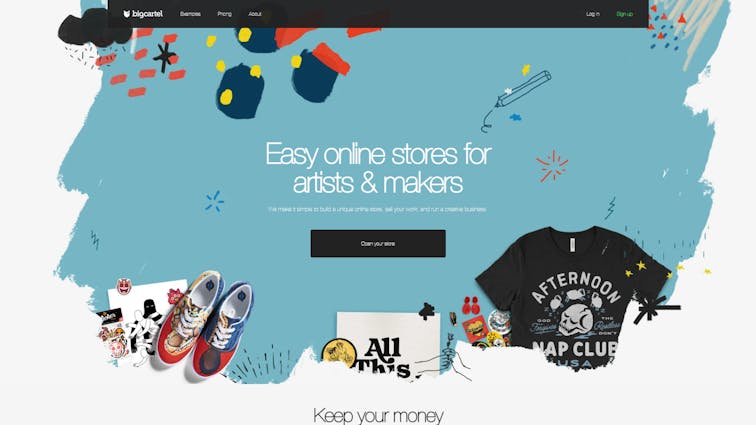
If you’re an independent artist, designer, or creative entrepreneur looking to sell your unique products online, Big Cartel is the perfect platform for you.
It offers a simple and user-friendly interface tailored to small businesses and artists, allowing you to showcase and sell your creations with ease.
Key Features and Pricing Plans
- Easy Store Setup: Big Cartel makes it effortless to set up your online store. With its intuitive interface and guided setup process, you can have your store up and running in no time.
- Product Management: The platform provides tools to manage your products efficiently. You can easily add new products, upload high-quality images, set pricing, and customize product options.
- Customizable Storefront: Big Cartel allows you to customize the appearance of your store to match your brand and style. You can choose from various themes and personalize colors, fonts, and layout without any coding knowledge.
- Inventory Tracking: The platform helps you keep track of your inventory levels, ensuring you never oversell. You can set stock quantities, receive low-stock alerts, and manage product variations effortlessly.
- Mobile Commerce: Big Cartel ensures your store is mobile-responsive, allowing customers to browse and purchase your products seamlessly from their smartphones or tablets.
- Marketing and Promotions: The platform offers built-in marketing tools to help you promote your products. You can create discount codes, run sales campaigns, and integrate with social media to reach a wider audience.
Pricing Plans:
- Free: Big Cartel offers a free plan that allows you to list up to 5 products, making it ideal for artists and creators just starting.
- Platinum: The Platinum plan, priced at $9.99 per month, allows you to list up to 50 products and provides additional customization options.
- Diamond: At $19.99 per month, the Diamond plan supports up to 500 products and offers advanced features such as inventory tracking and discount code creation.
Pros and Cons:
Pros:
- User-friendly interface and easy store setup.
- Customizable storefront to match your brand and style.
- Inventory tracking to manage stock levels effectively.
- Mobile-responsive design for a seamless mobile shopping experience.
- Built-in marketing tools for promoting your products.
Cons:
- Limited features compared to more robust ecommerce platforms.
- Customization options may be restricted compared to platforms with more flexibility.
- Higher-priced plans are required to access advanced features and support larger product catalogs.
Get Started On Your Headless Commerce Journey With Aasaan
Introducing Aasaan Headless Commerce - the simplified solution for businesses who want to enter the world of headless commerce without the hassle of high costs and developer dependencies.
Our frontend as a service platform seamlessly integrates with any eCommerce platform, providing a powerful backend solution to manage your inventory, orders, and payments.
In addition, our user-friendly, no-code headless storefront builder allows you to launch a high-converting storefront on any device.
With Aasaan Headless Commerce, you can experience the benefits of headless commerce without the complexities.
Final words:
In conclusion, choosing the right e-commerce platform for your business depends on your unique needs and requirements.
Each platform offers specific features, catering to different types of sellers and products. Take the time to evaluate their pros and cons, as well as the pricing plans and associated features offered by each platform.
By carefully considering your options, you can find the perfect solution to help you build a successful online store, reach a wider audience, and ultimately increase your sales and growth potential.



